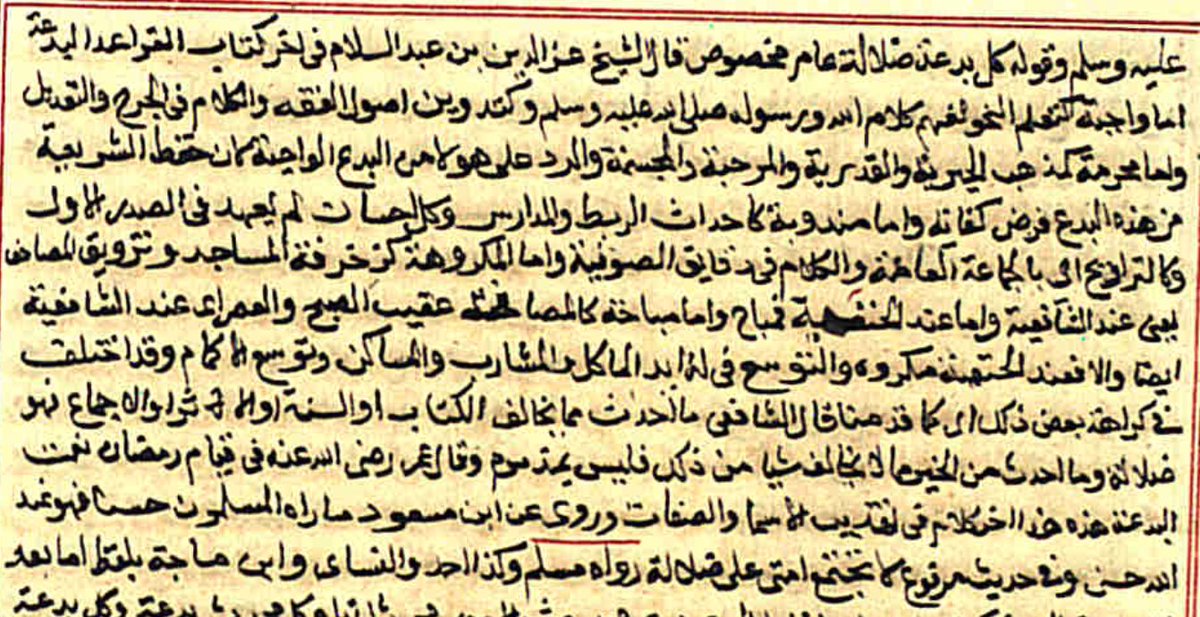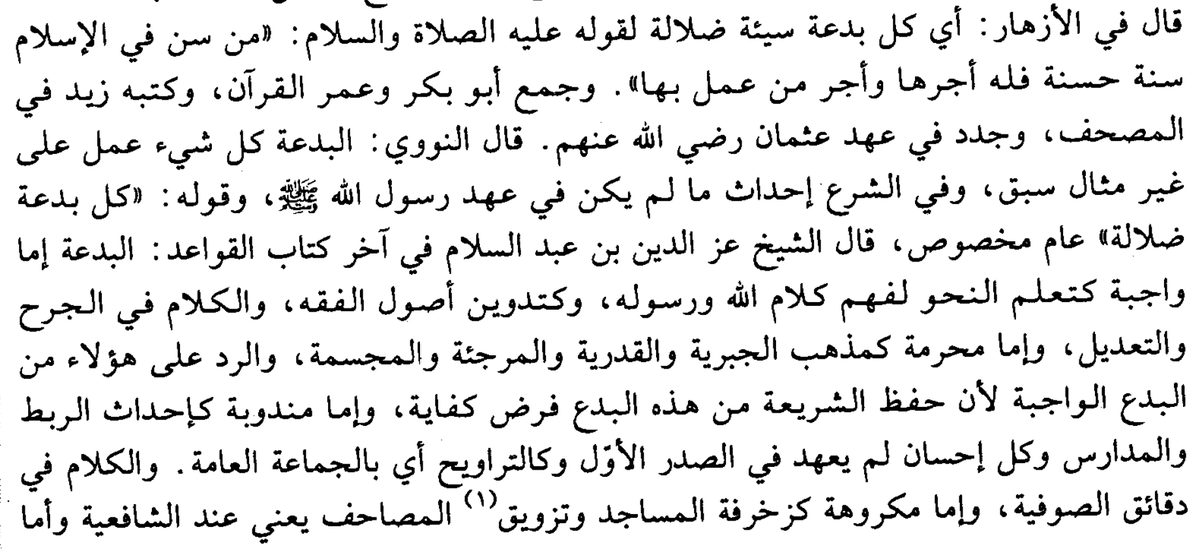MULLĀ ÁLĪ AL-QĀRĪ VIEW ON BIDÁH
The unsuspecting person who comes across this would be under the impression that Mullā Álī al-Qārī was of the position that every single new act is an evil innovation which makes one an innovator.
However, we can easily see he is quoting others. https://twitter.com/cantguard_zayyd/status/1352463116639068160">https://twitter.com/cantguard...
The unsuspecting person who comes across this would be under the impression that Mullā Álī al-Qārī was of the position that every single new act is an evil innovation which makes one an innovator.
However, we can easily see he is quoting others. https://twitter.com/cantguard_zayyd/status/1352463116639068160">https://twitter.com/cantguard...
He uses the word Qīl before this sentence, indicating that this is what is said by some people.
As for his own view regarding bidáh, then let us turn to the pages of the same volume, where he comments under the narration which mentions every bidáh is misguidance.
As for his own view regarding bidáh, then let us turn to the pages of the same volume, where he comments under the narration which mentions every bidáh is misguidance.
He writes:
❝In Azhār it says: ❛This means every evil bidáh is misguidance, due to his statement ﷺ, “One who establishes a good practice in Islām, he will have its reward and the reward of those who practice it.”❜
❝In Azhār it says: ❛This means every evil bidáh is misguidance, due to his statement ﷺ, “One who establishes a good practice in Islām, he will have its reward and the reward of those who practice it.”❜
Abu Bakr and Úmar collected the Qur’ān, Zayd wrote it in the muş’ĥaf and it was reworked in the time of Úthmān, may Allāh be pleased with them.
Nawawī said:
❛Bid’ah is everything done without a prior example and, in the Shari’ah, it is an invention of that which did not exist
Nawawī said:
❛Bid’ah is everything done without a prior example and, in the Shari’ah, it is an invention of that which did not exist
in the era of RasūlAllāh ﷺ. And his statement, “Every bidáh is misguidance”, is a general statement that is qualified.
Shaykh Ízzuddīn ibn Ábd al-Salām said at the end of Kitāb al-Qawāýid:
Bidáh is either Wājibah [obligatory], such as studying naĥw, in order to understand the
Shaykh Ízzuddīn ibn Ábd al-Salām said at the end of Kitāb al-Qawāýid:
Bidáh is either Wājibah [obligatory], such as studying naĥw, in order to understand the
Speech of Allāh and His Rasūl, establishing the discipline of principles of fiqh [Uşūl al-Fiqh], criticism of narrators. As for [Bidáh] Muĥarramah, then it is like The Jabarīyyah sect, The Qadarīyyah sect, The Murjiyyah sect, The Mujassimah sect, and refuting these sects is an
obligatory bidáh, because preserving the sharīáh from these bidáhs is farđ kifāyah. As for [Bidáh] Mandūbah, then it is like establishing cloisters and schools, every good thing or charity which was not established among the
first generation of Muslims, and like Tarāwīĥ, that is,
first generation of Muslims, and like Tarāwīĥ, that is,
in terms of general congregation, and expounding finer points of taşawwuf. As for [Bidáh] Makrūhah, then it is decorating and adorning mosques, embellishing copies of the Qur’ān, meaning according to the Shāfiýīs, as for according to the Ĥanafīs then it is mubāĥ.
As for [Bidáh] Mubāĥah then it is like shaking hands after morning [şubĥ] and afternoon [áşr] prayers, preparing and eating luxurious and delicious food and drink, living in spacious and comfortable dwellings, wearing newer forms of accessories.
There has been difference in the dislike of some things, as we have mentioned.
Shāfiýī, may Allāh have mercy upon him, said: That which opposes either the Book, the ĥadīth, athar or ijmāá; such an innovation is deviance [from the straight path].
Shāfiýī, may Allāh have mercy upon him, said: That which opposes either the Book, the ĥadīth, athar or ijmāá; such an innovation is deviance [from the straight path].
And that which is innovated for a good [cause] and does not oppose or contradict [Qur’ān or ĥadīth]; this is not a blameworthy innovation.
Úmar, may Allāh be pleased with him, said concerning [tarāwīĥ] prayers in Ramađān:
“What a fine innovation is this!”❜
Úmar, may Allāh be pleased with him, said concerning [tarāwīĥ] prayers in Ramađān:
“What a fine innovation is this!”❜
This is the end of the statement of the Shaykh in Tahdhīb al-Asma’a wa’l Lughāt.
It was narrated from Ibn Masúūd: ❛Whatever the Muslims deem to be good is good according to Allāh.❜
And in a marfūú ĥadīth: ❛My Ummah will not agree upon misguidance.❜❞
[pp. 337-338, #141]
It was narrated from Ibn Masúūd: ❛Whatever the Muslims deem to be good is good according to Allāh.❜
And in a marfūú ĥadīth: ❛My Ummah will not agree upon misguidance.❜❞
[pp. 337-338, #141]
Thus we see his view was not that every single new act is an evil innovation, rather he saw bidáh of different types, including that they may be permissible, recommended or even obligatory.

 Read on Twitter
Read on Twitter



![He writes in Mirqāt Sharĥ Mishkāt:“Uttering the niyyah with the tongue is from the good innovation [bidáh al-ĥasanah].”Vol. 4, pg. 426. He writes in Mirqāt Sharĥ Mishkāt:“Uttering the niyyah with the tongue is from the good innovation [bidáh al-ĥasanah].”Vol. 4, pg. 426.](https://pbs.twimg.com/media/Ey615AyWUAIGl31.png)
![He writes in Mirqāt Sharĥ Mishkāt:“Uttering the niyyah with the tongue is from the good innovation [bidáh al-ĥasanah].”Vol. 4, pg. 426. He writes in Mirqāt Sharĥ Mishkāt:“Uttering the niyyah with the tongue is from the good innovation [bidáh al-ĥasanah].”Vol. 4, pg. 426.](https://pbs.twimg.com/media/Ey62rqqXEAA0gEI.png)


